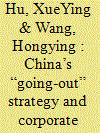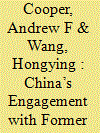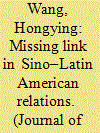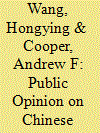|
|
|
Sort Order |
|
|
|
Items / Page
|
|
|
|
|
|
|
| Srl | Item |
| 1 |
ID:
178736


|
|
|
|
|
| Summary/Abstract |
The People’s Bank of China (PBC)has played an important role in China’s sustained economic growth. Despite its limited formal independence, PBC has developed considerable de facto authority and autonomy, referered to here as central bank discretion (CBD). This article offers a detailed historical account of how PBChas gained growing CBD in areas such as monetary policy, financial stability, foreign exchange and financial regulation. It also analyzes the main underlying forces that have contributed to PBC’s authority and autonomy.This study of CBD in China seeks to enrich the existing literature on the political economy of central banking, which has so far focused heavily on the concept of central bank independence (CBI).
|
|
|
|
|
|
|
|
|
|
|
|
|
|
|
|
| 2 |
ID:
162639


|
|
|
|
|
| Summary/Abstract |
As China’s influence in the world economy grows, scholars have become increasingly interested in distinct Chinese traditions of thought relating to the study of international political economy (IPE). While much has been written about historical Confucian ideas about tributary relations, IPE scholars have devoted little attention to another Chinese intellectual tradition that challenged those ideas in the 19th century: Chinese economic nationalism. In the wake of the two Opium Wars, early Chinese economic nationalist thinkers urged Chinese authorities to embrace a new priority of boosting the country’s wealth and power (fuqiang 富强) through an outward-oriented, state-led development strategy. Their ideas shared some similarities with Listian economic nationalism that became popular elsewhere in the world at this time, but they were developed without direct engagement with that Western-originated thought. The indigenous roots of 19th-century Chinese economic nationalism also gave it characteristics that distinguished it in interesting ways from the Western version of economic nationalism in that era. In addition to widening our understandings of Chinese traditions of IPE thought, this study of the distinct content and origins of early Chinese economic nationalism contributes to: recent efforts to overcome the Western-centric foundations of IPE thought, literature exploring the diversity of economic nationalist thought and its diffusion in the 19th century, and analyses of China’s post-1978 foreign economic policy.
|
|
|
|
|
|
|
|
|
|
|
|
|
|
|
|
| 3 |
ID:
091998


|
|
|
|
|
| Publication |
2009.
|
| Summary/Abstract |
China's development has enormous implications for how the world is governed. The sheer size of the country means the effect of its activities inevitably spills over its borders. Beyond that, there is evidence that the Chinese government has taken an active role in a number of policy areas to defend China's expanding national interest and to strengthen its status in the world.As China's economy and its political ambition continue to grow, so will its influence around the world. In this article, we examine Chinese views and practices with regard to global governance. We also disuss the major factors that will shape the future of China's involvement in global governance.
|
|
|
|
|
|
|
|
|
|
|
|
|
|
|
|
| 4 |
ID:
156257


|
|
|
|
|
| Summary/Abstract |
China’s rapidly growing outbound foreign direct investment (OFDI) has attracted a great deal of concern about its impact on the recipient countries. But so far there has been little research on what effect the “going-out” strategy has had on China itself. This is an important question to study because the answer to it will shed light on what kind of an international actor China is becoming as it becomes further integrated with the global economy and what outside influence there can be on China’s domestic governance reform. This article explores the effect of investing overseas on Chinese companies in the area of corporate social responsibility (CSR). Through an analysis of an original sample of data, the authors find preliminary evidence of a positive impact of OFDI on Chinese companies’ commitment to CSR. More research will be needed to uncover the mechanisms and limitations of this apparent trend toward institutional convergence.
|
|
|
|
|
|
|
|
|
|
|
|
|
|
|
|
| 5 |
ID:
173178


|
|
|
|
|
| Summary/Abstract |
In recent years many former heads of foreign governments have visited China, appearing at various forums, conferences, and other events. China’s engagement with these former leaders may appear to be a form of public diplomacy, but even more importantly it has been a strategy of political legitimation adopted by the Chinese Communist Party. Based on an original database of hundreds of cases, we provide a systematic analysis of the visits of former foreign leaders to China and of their role as external validators for the party-state and its policy initiatives, particularly the Belt and Road Initiative. By shedding light on the Party’s search for external consent and support, we seek to fill a significant gap in the literature, which tends to focus narrowly on the domestic sources of legitimacy and domestic strategies of legitimation.
|
|
|
|
|
|
|
|
|
|
|
|
|
|
|
|
| 6 |
ID:
082722


|
|
|
|
|
| Publication |
2008.
|
| Summary/Abstract |
recent years the concept of 'soft power', popularized by the work of Joseph Nye, has gained currency in both China and Taiwan. This paper explores how the Chinese and Taiwanese understand soft power and its sources, and how their understanding differs from Nye's formulation. It discusses why this foreign concept has become so salient in the Chinese and the Taiwanese discourse. It also examines the impact of this concept on the external policies of China and Taiwan. The paper concludes by pointing out the limitations of the concept of soft power.
|
|
|
|
|
|
|
|
|
|
|
|
|
|
|
|
| 7 |
ID:
076462


|
|
|
| 8 |
ID:
123532


|
|
|
|
|
| Publication |
2013.
|
| Summary/Abstract |
This article compares and evaluates the contributions of middle range powers to global governance initiatives. Examining participation in terms of personnel, financial and ideational contributions, we test several hypotheses derived from neorealism, critical theory, liberalism, constructivism, and post-internationalism against six cases: Canada, Japan, China, Russia, India and Brazil. We find that material power has a negative impact on contributions, while a country's leadership's attitude towards the international order, the length of its membership in major international organisations and the strength of its civil society all seem to have positive effects on its participation in global governance. Trade dependence, however, does not seem to exhibit the expected impact. The article indicates that multiple theoretical approaches may prove useful for evaluating the behaviour of middle range powers, and that further research should be conducted on the relative importance of each of the factors mentioned above in explaining middle range power contributions to global governance.
|
|
|
|
|
|
|
|
|
|
|
|
|
|
|
|
| 9 |
ID:
140488


|
|
|
|
|
| Summary/Abstract |
The growing economic presence of China around the world is a widely recognized reality. China's expanding economic relations with other developing countries have generated both positive and negative reactions. Many believe that the increasing economic ties between China and these countries will enhance China's political influence and encourage political cooperation between China and other countries in the Global South. How strong is the economic–political link? This article examines this question in the context of Sino–Latin American relations in recent years. It finds that thus far China's expanding economic relations with the region have not had a significant spillover effect into the political realm. The article provides preliminary explanations of the missing link between the economic and the political. It calls for more nuanced ways to apply familiar international relations paradigms to understanding the implications of the rise of China.
|
|
|
|
|
|
|
|
|
|
|
|
|
|
|
|
| 10 |
ID:
168425


|
|
|
|
|
| Summary/Abstract |
In this article, we examine China's promotion of the renminbi (RMB) in international oil trade and explore its implications for the international currency system in the short and the long term. The article traces the rise of the RMB in international oil trade in recent years and provides an analysis of its impact on the internationalization of the Chinese currency. We argue that despite the increasing use of the yuan in oil trade in recent years, in the short term it is highly unlikely that a petro-RMB system will emerge to rival the petrodollar system. Unlike the petrodollar, which combines the qualities of a master currency, a top currency and a negotiated currency, China lacks the economic leadership and the political and geopolitical leverages to make the RMB a major petrocurrency. Although the emergence of the RMB-denominated Shanghai oil futures is an important development, the absence of highly developed financial markets and a strong legal system in China hinders its potential. In the long run, the RMB may take on a more prominent role in the international oil trade as China's weight as an oil importer rises. More importantly, the overuse of financial sanctions by the US government has begun to undermine the role of the dollar within and beyond the oil trade. In addition, the rise of alternative energy sources will diminish the centrality of oil in the world economy, thus reducing the significance of petrocurrencies—whether the dollar or the RMB—in shaping the international currency system.
|
|
|
|
|
|
|
|
|
|
|
|
|
|
|
|
| 11 |
ID:
192102


|
|
|
|
|
| Summary/Abstract |
The expanding profile of Chinese international development aid has generated strong academic and policy interests. A growing literature has emerged on Chinese foreign aid’s motivations, modalities, and impact. However, a significant lacuna remains in the domestic politics relating to this phenomenon. This gap is especially glaring in public opinion concerning China’s growing foreign aid programs. By analyzing empirical data gathered from a variety of sources, including a well-established online forum, social media sites of two influential media organizations, and multi-year surveys of residents of Beijing, this paper presents a nuanced picture of what the Chinese public thinks of Chinese foreign aid and tests two popular explanations of public opposition to foreign aid—perceived budgetary trade-offs and more general dissatisfaction with government policies.
|
|
|
|
|
|
|
|
|
|
|
|
|
|
|
|
|
|
|
|
|